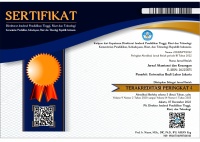Konstruksi Akuntansi Insentif di Konteks Organisasi Ketenagalistrikan Jawa Tengah
Abstract
Keywords
Full Text:
PDFReferences
Arizah, A., Darwin, K., & Fuada, N. (2022). Pemberian Insentif Pajak Bagi Pelaku UMKM Di Masa Pandemi Covid 19. Jurnal Akuntansi Dan Pajak, 23(1), 1–9.
Belkaoui, A. (1989). Accounting and language. Journal of Accounting Li, 8, 281–292.
Bénet, N., Deville, A., Raïes, K., & Valette-Florence, P. (2022). Turning non-financial performance measurements into financial performance: The usefulness of front-office staff incentive systems in hotels. Journal of Business Research, 142(May 2021), 317–327. https://doi.org/10.1016/j.jbusres.2021.12.017
Chowdhury, H., Hossain, A., Tan, K., & Zheng, J. (2022). Do external labor market incentives improve labor investment efficiency? Journal of Behavioral and Experimental Finance, 34, 100648. https://doi.org/10.1016/j.jbef.2022.100648
Dobija, M. (2003). Wage, money and accounting: Theoretical relationships. Argumenta Oeconomica Cracoviensia, 2(2).
Fisher, J. G. (2003). Sales Rewards and Incentives.
Merchant, K. A., & Stede, W. A. Van Der. (2017). Management control systems: performance measurement, evaluation and incentives. In Pearson Education Limited.
Speckbacher, G., & Wabnegg, M. (2020). Incentivizing innovation: The role of knowledge exchange and distal search behavior. Accounting, Organizations and Society, 86, 101142. https://doi.org/10.1016/j.aos.2020.101142
Susilowati, S. H. (2016). Kebijakan Insentif Untuk Petani Muda: Pembelajaran dari Berbagai Negara dan Implikasinya bagi Kebijakan di Indonesia. Forum Penelitian Agro Ekonomi, 34(2), 103. https://doi.org/10.21082/fae.v34n2.2016.103-123
https://www.bps.go.id/indicator/23/183/3/jumlah-penduduk-miskin-menurut-wilayah.html
DOI: https://doi.org/10.36080/jak.v12i2.2256
Refbacks
- There are currently no refbacks.

This work is licensed under a Creative Commons Attribution 4.0 International License.
Fakultas Ekonomi dan Bisnis, Program Studi Akuntansi. Universitas Budi Luhur, Jl. Ciledug Raya, Petukangan Utara, Jakarta Selatan, DKI Jakarta 12260, Indonesia

This work is licensed under a Creative Commons Attribution 4.0 International License.












